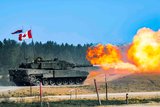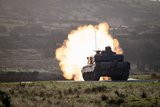Senior UK general says Ukraine war lessons should reshape defence priorities
One success story for the British Army is its mobilisation to train Ukrainian troops in the UK under Operation Interflex. (Photo: UK MoD Crown Copyright)
According to Maj Gen Charles Collins, the UK Assistant Chief of the General Staff, the Ukraine War has highlighted the British Army's shortcomings while also underlining the continuing need for boots on the ground in conflicts.
Writing in the British Army Review, Collins said that the focus on counter-terrorism and counter-insurgency has left the army deficient in areas such as air defence, long-range fires, uncrewed aerial systems, and electronic warfare. He added that outdated assumptions about warfighting have led to a lack of preparedness for high-intensity combat.
However, sounding a note of optimism, he said that current Chief of the General Staff, Gen Sir Patrick Sanders, has mobilised the army to correct course.
Related Articles
Will British Army Boxer IFVs feature the Patria Nemo mortar system?
Guns aplenty as British Army accelerates plans for new artillery
UK readies Ukrainian soldiers for Challenger tank operations
Collins said that the army's mobilisation under the Future Soldier plan remains a key focus, with five lines of effort. These include building a combat-credible force, supporting Ukraine through Operation Interflex training schemes, meeting the requirements of NATO's New Force Model, addressing productivity and reinforcing leadership in NATO. The army is believed to have already trained over 10,000 Ukrainian soldiers and continues to enhance its capabilities in this area.
The mobilisation of the army in support of Ukraine is an acknowledgment that the return of visceral, high-intensity land warfare to Europe has thrown its core purpose into sharp relief. Collins said that it has repudiated the arguments that British policy should prioritise the cyber, space, air and maritime domains instead of land warfare.
However, he added that the army faces challenges in mobilising, as it is only three years into the decade of delivery for Future Soldier and has only delivered 40% of the promised organisational changes. Collins also acknowledged that the prevailing financial climate in the UK also poses a challenge, although Prime Minister Rishi Sunak may announce an increase in the defence budget
In conclusion, Collins said that despite some progress, challenges remain and the army must seek opportunities amongst them to accelerate its modernisation.
More from Land Warfare
-
![US DoD task force’s DroneHunter acquisition lays groundwork for Replicator 2 CUAS strategy]()
US DoD task force’s DroneHunter acquisition lays groundwork for Replicator 2 CUAS strategy
As the US Department of Defense looks to counter the growing threat of uncrewed aerial systems to improve homeland security, the DroneHunter acquisition could point to future commercial innovation.
-
![Norway opts for Hanwha’s Chunmoo for long-range fires under $2 billion deal]()
Norway opts for Hanwha’s Chunmoo for long-range fires under $2 billion deal
The selection of Hanwha’s K239 Chunmoo long-range precision fires system, with a contract expected to be signed on 30 January, makes Norway the second European country to choose the system. It is expected an operational system will be in service within four years.
-
![Layered protection: How air defence is adapting to rising drone and missile threats (podcast)]()
Layered protection: How air defence is adapting to rising drone and missile threats (podcast)
A surge in aerial threats – from advanced missiles to low-cost drones – is reshaping the way militaries approach air defence, driving demand for flexible, multi-layered solutions.























